Report on Organisational Types, Purposes, and Stakeholder Needs
VerifiedAdded on 2021/02/21
|7
|1353
|30
Report
AI Summary
This report provides a comprehensive analysis of different organisational types, including private, public, and voluntary organisations, examining their purposes and operational structures within the business environment. It uses real-world examples like NHS (a public healthcare system) and Ibis Hotels (a private international hotel chain) to illustrate these concepts. The report delves into the significance of various stakeholders, such as employees, clients, funders, community, and local government, and how their interactions and requirements influence organisational goals and objectives. It highlights the importance of understanding the business environment and its impact on organisational performance and sustainability, concluding that a thorough understanding of organisational types and stakeholder needs is essential for business success. The report includes references to academic sources to support its findings.

Online article
Paraphrase This Document
Need a fresh take? Get an instant paraphrase of this document with our AI Paraphraser
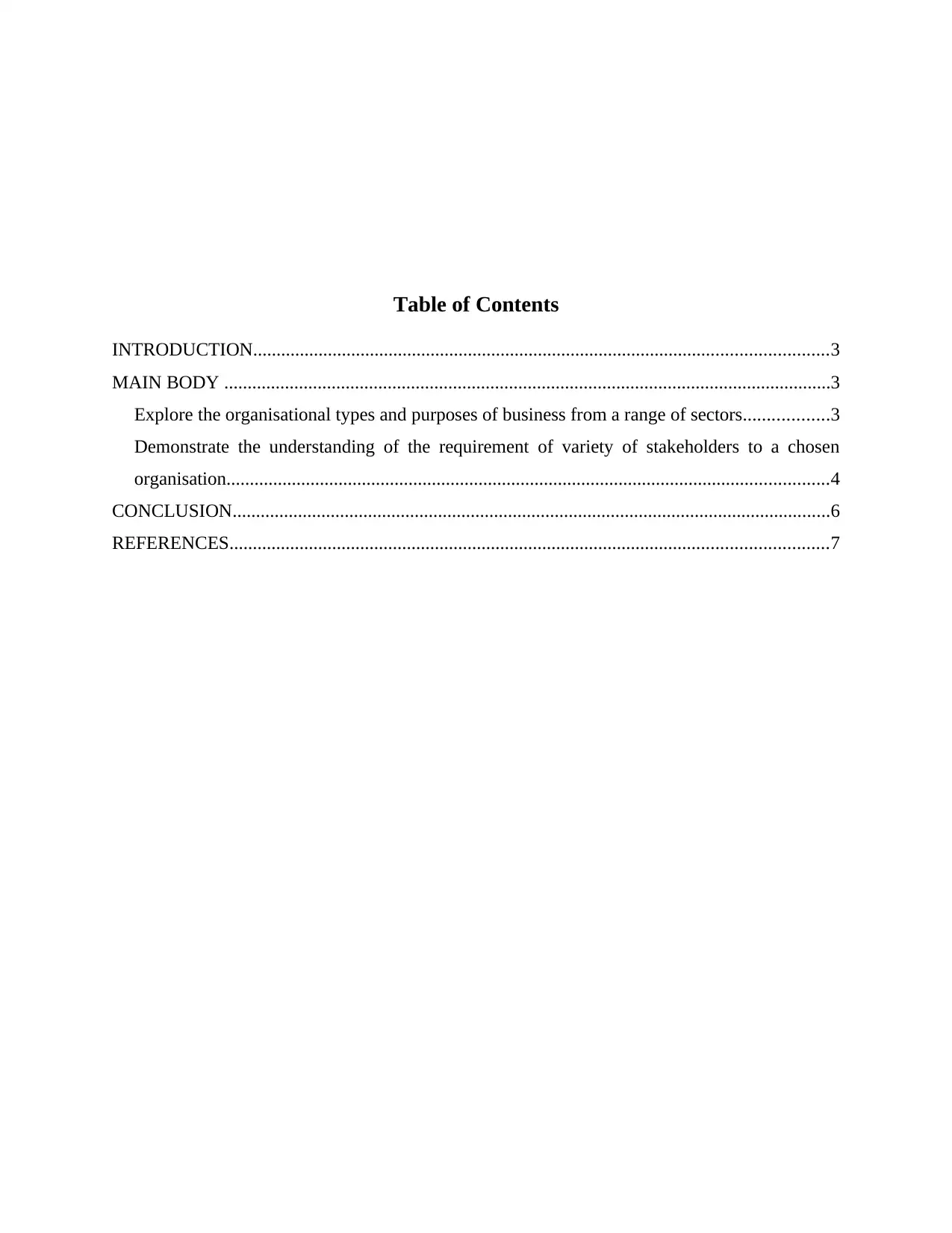
Table of Contents
INTRODUCTION...........................................................................................................................3
MAIN BODY ..................................................................................................................................3
Explore the organisational types and purposes of business from a range of sectors..................3
Demonstrate the understanding of the requirement of variety of stakeholders to a chosen
organisation.................................................................................................................................4
CONCLUSION................................................................................................................................6
REFERENCES................................................................................................................................7
INTRODUCTION...........................................................................................................................3
MAIN BODY ..................................................................................................................................3
Explore the organisational types and purposes of business from a range of sectors..................3
Demonstrate the understanding of the requirement of variety of stakeholders to a chosen
organisation.................................................................................................................................4
CONCLUSION................................................................................................................................6
REFERENCES................................................................................................................................7
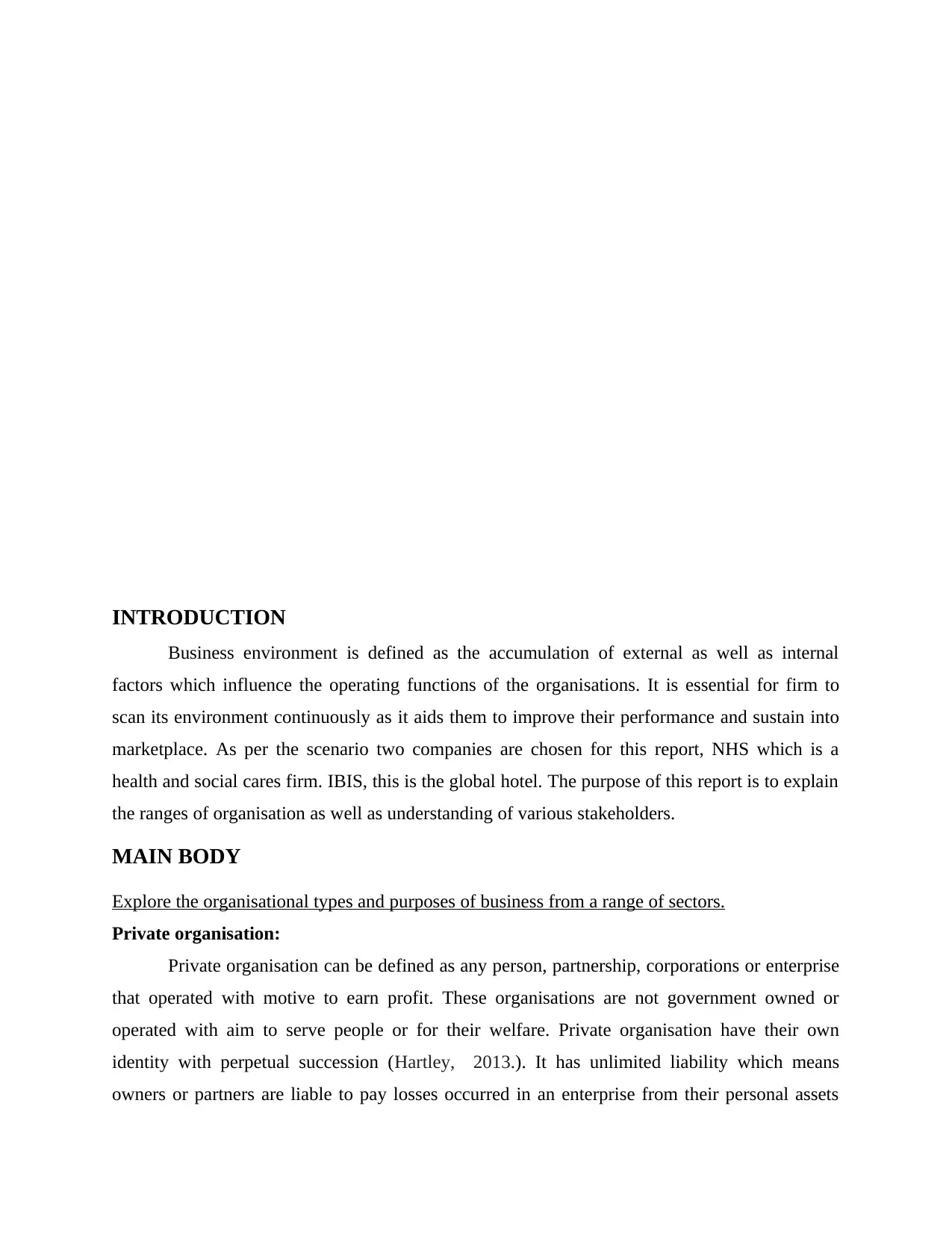
INTRODUCTION
Business environment is defined as the accumulation of external as well as internal
factors which influence the operating functions of the organisations. It is essential for firm to
scan its environment continuously as it aids them to improve their performance and sustain into
marketplace. As per the scenario two companies are chosen for this report, NHS which is a
health and social cares firm. IBIS, this is the global hotel. The purpose of this report is to explain
the ranges of organisation as well as understanding of various stakeholders.
MAIN BODY
Explore the organisational types and purposes of business from a range of sectors.
Private organisation:
Private organisation can be defined as any person, partnership, corporations or enterprise
that operated with motive to earn profit. These organisations are not government owned or
operated with aim to serve people or for their welfare. Private organisation have their own
identity with perpetual succession (Hartley, 2013.). It has unlimited liability which means
owners or partners are liable to pay losses occurred in an enterprise from their personal assets
Business environment is defined as the accumulation of external as well as internal
factors which influence the operating functions of the organisations. It is essential for firm to
scan its environment continuously as it aids them to improve their performance and sustain into
marketplace. As per the scenario two companies are chosen for this report, NHS which is a
health and social cares firm. IBIS, this is the global hotel. The purpose of this report is to explain
the ranges of organisation as well as understanding of various stakeholders.
MAIN BODY
Explore the organisational types and purposes of business from a range of sectors.
Private organisation:
Private organisation can be defined as any person, partnership, corporations or enterprise
that operated with motive to earn profit. These organisations are not government owned or
operated with aim to serve people or for their welfare. Private organisation have their own
identity with perpetual succession (Hartley, 2013.). It has unlimited liability which means
owners or partners are liable to pay losses occurred in an enterprise from their personal assets
⊘ This is a preview!⊘
Do you want full access?
Subscribe today to unlock all pages.

Trusted by 1+ million students worldwide
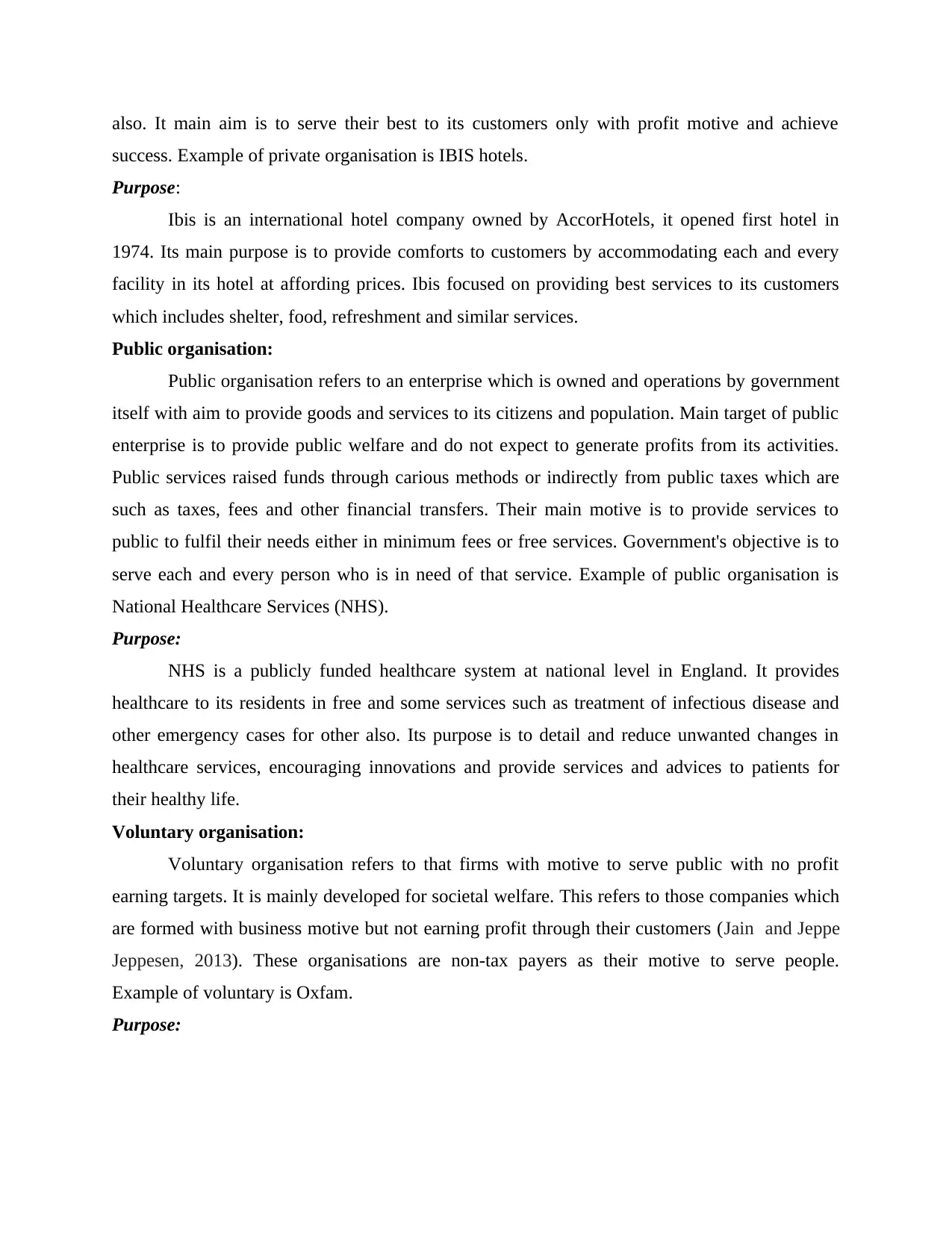
also. It main aim is to serve their best to its customers only with profit motive and achieve
success. Example of private organisation is IBIS hotels.
Purpose:
Ibis is an international hotel company owned by AccorHotels, it opened first hotel in
1974. Its main purpose is to provide comforts to customers by accommodating each and every
facility in its hotel at affording prices. Ibis focused on providing best services to its customers
which includes shelter, food, refreshment and similar services.
Public organisation:
Public organisation refers to an enterprise which is owned and operations by government
itself with aim to provide goods and services to its citizens and population. Main target of public
enterprise is to provide public welfare and do not expect to generate profits from its activities.
Public services raised funds through carious methods or indirectly from public taxes which are
such as taxes, fees and other financial transfers. Their main motive is to provide services to
public to fulfil their needs either in minimum fees or free services. Government's objective is to
serve each and every person who is in need of that service. Example of public organisation is
National Healthcare Services (NHS).
Purpose:
NHS is a publicly funded healthcare system at national level in England. It provides
healthcare to its residents in free and some services such as treatment of infectious disease and
other emergency cases for other also. Its purpose is to detail and reduce unwanted changes in
healthcare services, encouraging innovations and provide services and advices to patients for
their healthy life.
Voluntary organisation:
Voluntary organisation refers to that firms with motive to serve public with no profit
earning targets. It is mainly developed for societal welfare. This refers to those companies which
are formed with business motive but not earning profit through their customers (Jain and Jeppe
Jeppesen, 2013). These organisations are non-tax payers as their motive to serve people.
Example of voluntary is Oxfam.
Purpose:
success. Example of private organisation is IBIS hotels.
Purpose:
Ibis is an international hotel company owned by AccorHotels, it opened first hotel in
1974. Its main purpose is to provide comforts to customers by accommodating each and every
facility in its hotel at affording prices. Ibis focused on providing best services to its customers
which includes shelter, food, refreshment and similar services.
Public organisation:
Public organisation refers to an enterprise which is owned and operations by government
itself with aim to provide goods and services to its citizens and population. Main target of public
enterprise is to provide public welfare and do not expect to generate profits from its activities.
Public services raised funds through carious methods or indirectly from public taxes which are
such as taxes, fees and other financial transfers. Their main motive is to provide services to
public to fulfil their needs either in minimum fees or free services. Government's objective is to
serve each and every person who is in need of that service. Example of public organisation is
National Healthcare Services (NHS).
Purpose:
NHS is a publicly funded healthcare system at national level in England. It provides
healthcare to its residents in free and some services such as treatment of infectious disease and
other emergency cases for other also. Its purpose is to detail and reduce unwanted changes in
healthcare services, encouraging innovations and provide services and advices to patients for
their healthy life.
Voluntary organisation:
Voluntary organisation refers to that firms with motive to serve public with no profit
earning targets. It is mainly developed for societal welfare. This refers to those companies which
are formed with business motive but not earning profit through their customers (Jain and Jeppe
Jeppesen, 2013). These organisations are non-tax payers as their motive to serve people.
Example of voluntary is Oxfam.
Purpose:
Paraphrase This Document
Need a fresh take? Get an instant paraphrase of this document with our AI Paraphraser
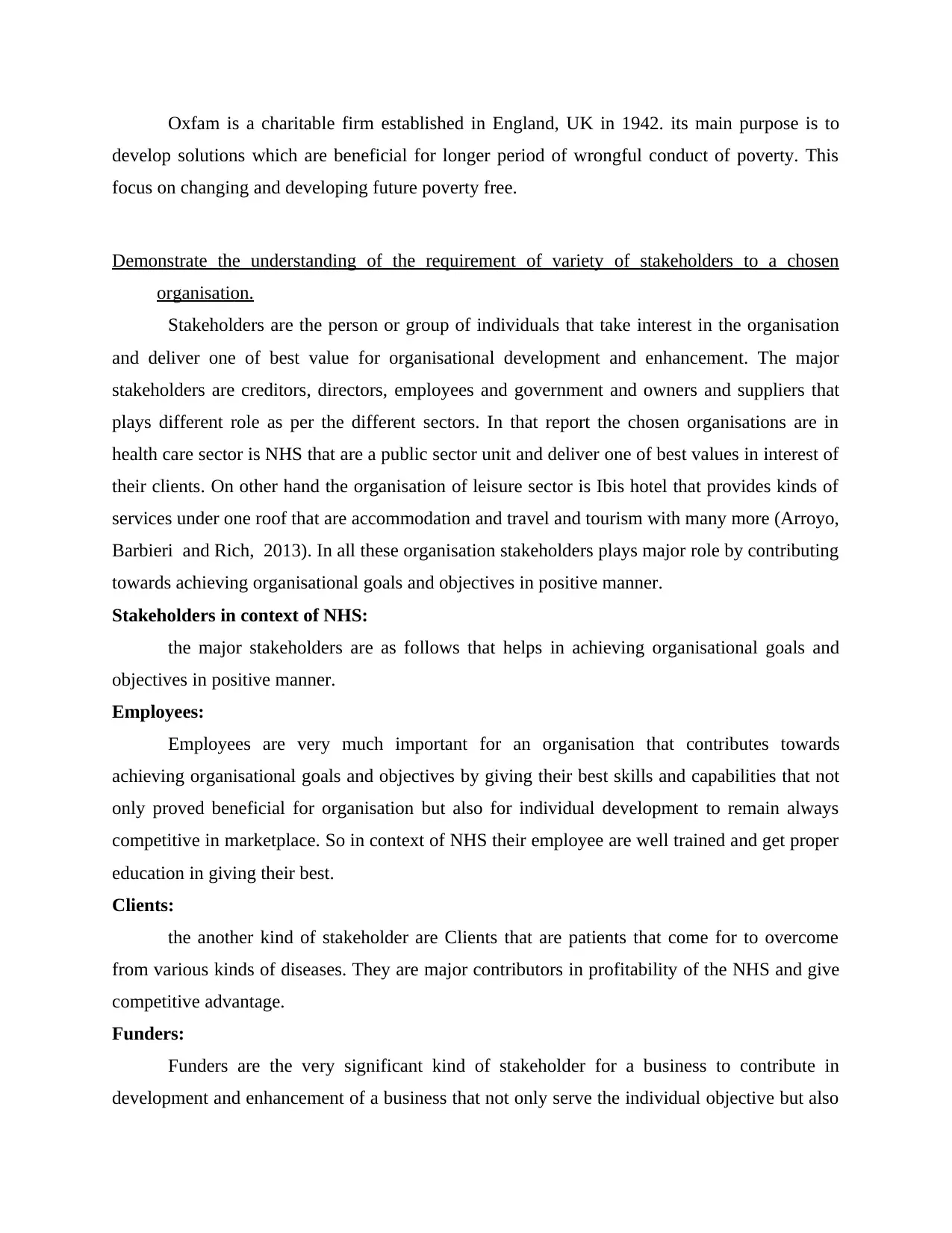
Oxfam is a charitable firm established in England, UK in 1942. its main purpose is to
develop solutions which are beneficial for longer period of wrongful conduct of poverty. This
focus on changing and developing future poverty free.
Demonstrate the understanding of the requirement of variety of stakeholders to a chosen
organisation.
Stakeholders are the person or group of individuals that take interest in the organisation
and deliver one of best value for organisational development and enhancement. The major
stakeholders are creditors, directors, employees and government and owners and suppliers that
plays different role as per the different sectors. In that report the chosen organisations are in
health care sector is NHS that are a public sector unit and deliver one of best values in interest of
their clients. On other hand the organisation of leisure sector is Ibis hotel that provides kinds of
services under one roof that are accommodation and travel and tourism with many more (Arroyo,
Barbieri and Rich, 2013). In all these organisation stakeholders plays major role by contributing
towards achieving organisational goals and objectives in positive manner.
Stakeholders in context of NHS:
the major stakeholders are as follows that helps in achieving organisational goals and
objectives in positive manner.
Employees:
Employees are very much important for an organisation that contributes towards
achieving organisational goals and objectives by giving their best skills and capabilities that not
only proved beneficial for organisation but also for individual development to remain always
competitive in marketplace. So in context of NHS their employee are well trained and get proper
education in giving their best.
Clients:
the another kind of stakeholder are Clients that are patients that come for to overcome
from various kinds of diseases. They are major contributors in profitability of the NHS and give
competitive advantage.
Funders:
Funders are the very significant kind of stakeholder for a business to contribute in
development and enhancement of a business that not only serve the individual objective but also
develop solutions which are beneficial for longer period of wrongful conduct of poverty. This
focus on changing and developing future poverty free.
Demonstrate the understanding of the requirement of variety of stakeholders to a chosen
organisation.
Stakeholders are the person or group of individuals that take interest in the organisation
and deliver one of best value for organisational development and enhancement. The major
stakeholders are creditors, directors, employees and government and owners and suppliers that
plays different role as per the different sectors. In that report the chosen organisations are in
health care sector is NHS that are a public sector unit and deliver one of best values in interest of
their clients. On other hand the organisation of leisure sector is Ibis hotel that provides kinds of
services under one roof that are accommodation and travel and tourism with many more (Arroyo,
Barbieri and Rich, 2013). In all these organisation stakeholders plays major role by contributing
towards achieving organisational goals and objectives in positive manner.
Stakeholders in context of NHS:
the major stakeholders are as follows that helps in achieving organisational goals and
objectives in positive manner.
Employees:
Employees are very much important for an organisation that contributes towards
achieving organisational goals and objectives by giving their best skills and capabilities that not
only proved beneficial for organisation but also for individual development to remain always
competitive in marketplace. So in context of NHS their employee are well trained and get proper
education in giving their best.
Clients:
the another kind of stakeholder are Clients that are patients that come for to overcome
from various kinds of diseases. They are major contributors in profitability of the NHS and give
competitive advantage.
Funders:
Funders are the very significant kind of stakeholder for a business to contribute in
development and enhancement of a business that not only serve the individual objective but also
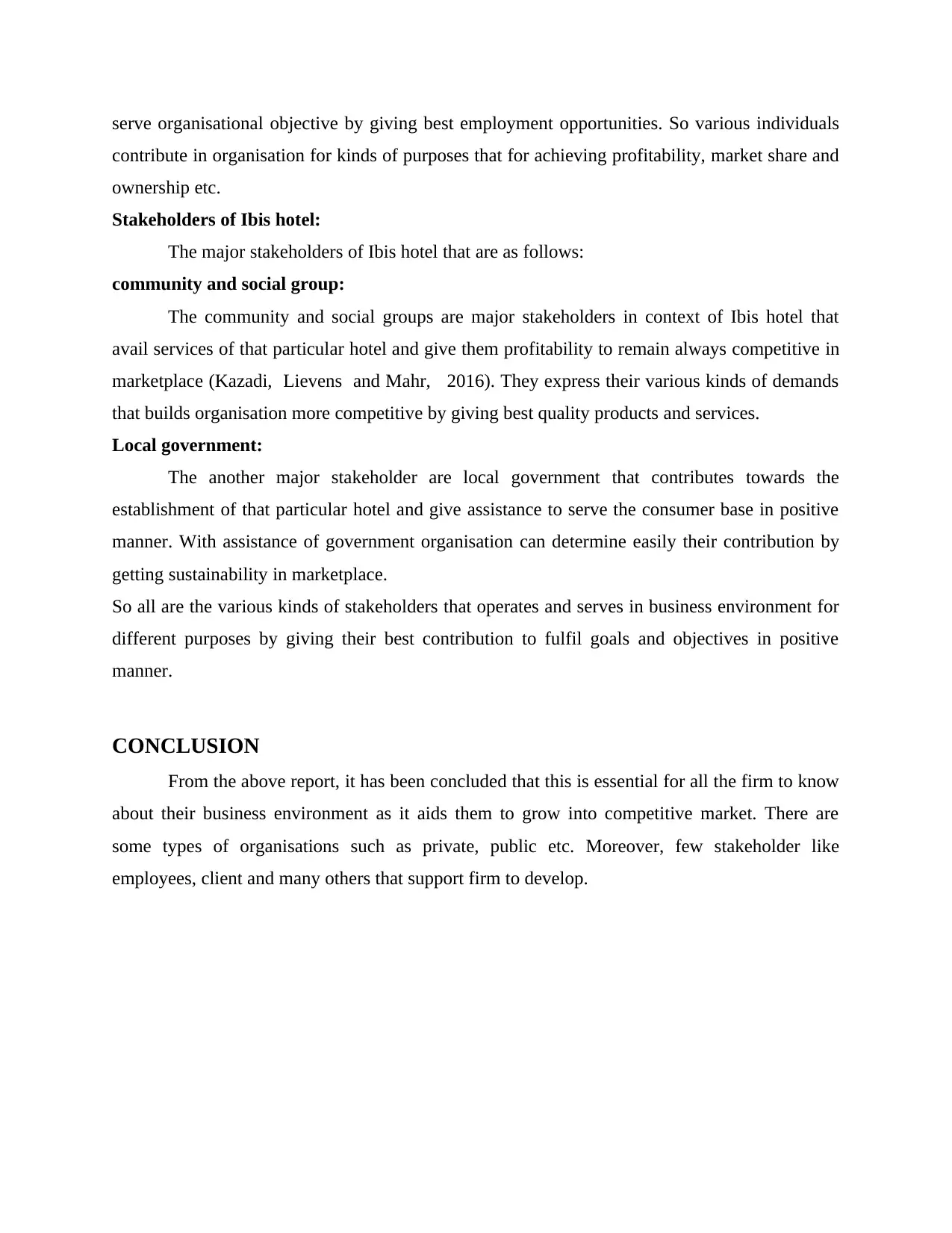
serve organisational objective by giving best employment opportunities. So various individuals
contribute in organisation for kinds of purposes that for achieving profitability, market share and
ownership etc.
Stakeholders of Ibis hotel:
The major stakeholders of Ibis hotel that are as follows:
community and social group:
The community and social groups are major stakeholders in context of Ibis hotel that
avail services of that particular hotel and give them profitability to remain always competitive in
marketplace (Kazadi, Lievens and Mahr, 2016). They express their various kinds of demands
that builds organisation more competitive by giving best quality products and services.
Local government:
The another major stakeholder are local government that contributes towards the
establishment of that particular hotel and give assistance to serve the consumer base in positive
manner. With assistance of government organisation can determine easily their contribution by
getting sustainability in marketplace.
So all are the various kinds of stakeholders that operates and serves in business environment for
different purposes by giving their best contribution to fulfil goals and objectives in positive
manner.
CONCLUSION
From the above report, it has been concluded that this is essential for all the firm to know
about their business environment as it aids them to grow into competitive market. There are
some types of organisations such as private, public etc. Moreover, few stakeholder like
employees, client and many others that support firm to develop.
contribute in organisation for kinds of purposes that for achieving profitability, market share and
ownership etc.
Stakeholders of Ibis hotel:
The major stakeholders of Ibis hotel that are as follows:
community and social group:
The community and social groups are major stakeholders in context of Ibis hotel that
avail services of that particular hotel and give them profitability to remain always competitive in
marketplace (Kazadi, Lievens and Mahr, 2016). They express their various kinds of demands
that builds organisation more competitive by giving best quality products and services.
Local government:
The another major stakeholder are local government that contributes towards the
establishment of that particular hotel and give assistance to serve the consumer base in positive
manner. With assistance of government organisation can determine easily their contribution by
getting sustainability in marketplace.
So all are the various kinds of stakeholders that operates and serves in business environment for
different purposes by giving their best contribution to fulfil goals and objectives in positive
manner.
CONCLUSION
From the above report, it has been concluded that this is essential for all the firm to know
about their business environment as it aids them to grow into competitive market. There are
some types of organisations such as private, public etc. Moreover, few stakeholder like
employees, client and many others that support firm to develop.
⊘ This is a preview!⊘
Do you want full access?
Subscribe today to unlock all pages.

Trusted by 1+ million students worldwide
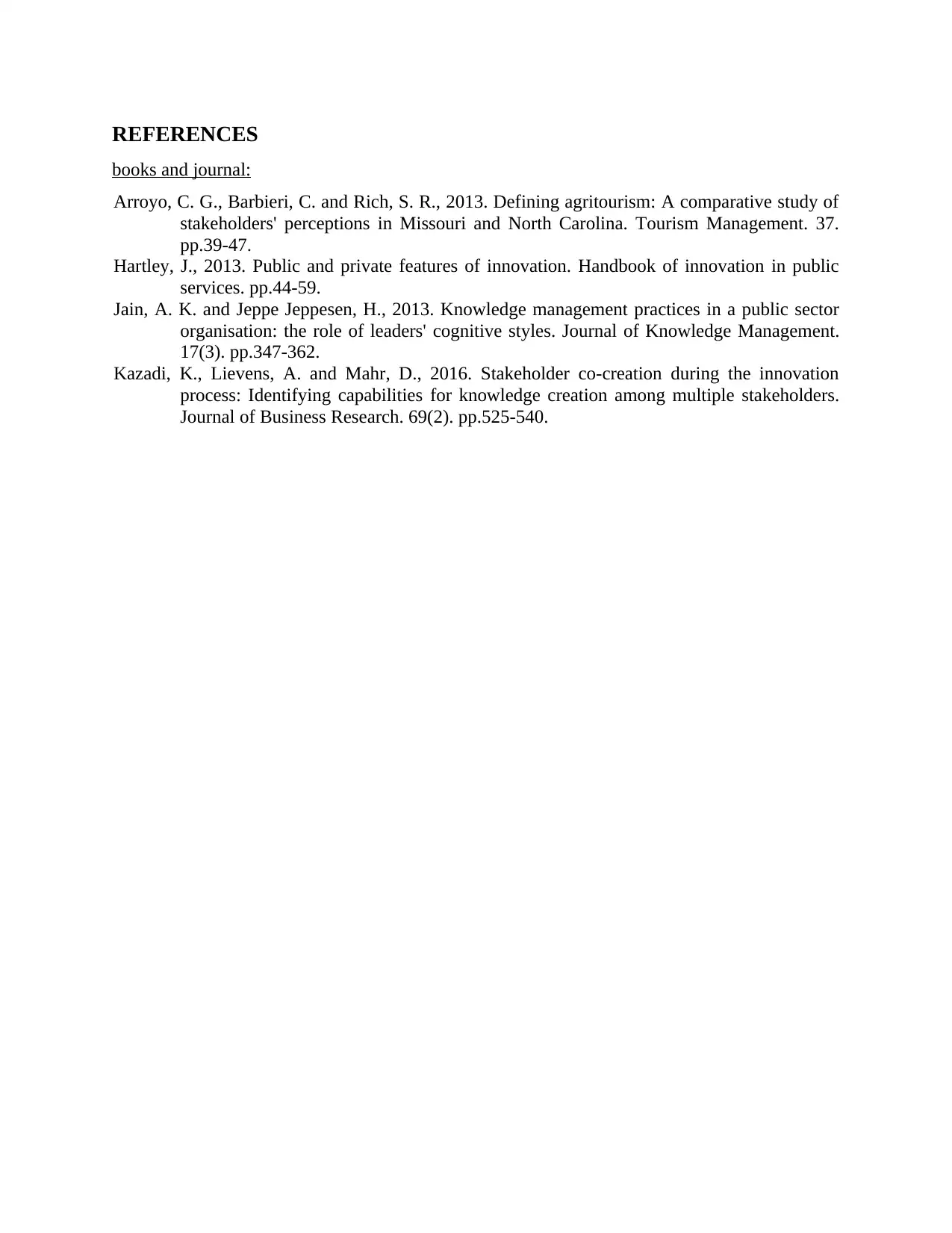
REFERENCES
books and journal:
Arroyo, C. G., Barbieri, C. and Rich, S. R., 2013. Defining agritourism: A comparative study of
stakeholders' perceptions in Missouri and North Carolina. Tourism Management. 37.
pp.39-47.
Hartley, J., 2013. Public and private features of innovation. Handbook of innovation in public
services. pp.44-59.
Jain, A. K. and Jeppe Jeppesen, H., 2013. Knowledge management practices in a public sector
organisation: the role of leaders' cognitive styles. Journal of Knowledge Management.
17(3). pp.347-362.
Kazadi, K., Lievens, A. and Mahr, D., 2016. Stakeholder co-creation during the innovation
process: Identifying capabilities for knowledge creation among multiple stakeholders.
Journal of Business Research. 69(2). pp.525-540.
books and journal:
Arroyo, C. G., Barbieri, C. and Rich, S. R., 2013. Defining agritourism: A comparative study of
stakeholders' perceptions in Missouri and North Carolina. Tourism Management. 37.
pp.39-47.
Hartley, J., 2013. Public and private features of innovation. Handbook of innovation in public
services. pp.44-59.
Jain, A. K. and Jeppe Jeppesen, H., 2013. Knowledge management practices in a public sector
organisation: the role of leaders' cognitive styles. Journal of Knowledge Management.
17(3). pp.347-362.
Kazadi, K., Lievens, A. and Mahr, D., 2016. Stakeholder co-creation during the innovation
process: Identifying capabilities for knowledge creation among multiple stakeholders.
Journal of Business Research. 69(2). pp.525-540.
1 out of 7
Related Documents
Your All-in-One AI-Powered Toolkit for Academic Success.
+13062052269
info@desklib.com
Available 24*7 on WhatsApp / Email
![[object Object]](/_next/static/media/star-bottom.7253800d.svg)
Unlock your academic potential
Copyright © 2020–2026 A2Z Services. All Rights Reserved. Developed and managed by ZUCOL.





